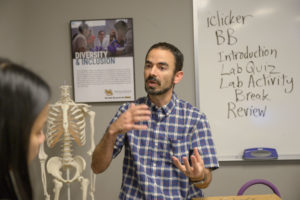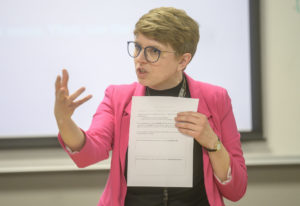Office of the Provost > Institutional Assessment


Office of the Provost > Institutional Assessment
 At Nevada State College, we require a systematic reporting process to integrate college-wide information under a common reporting model that both contains and organizes key information. A basic assessment format provides the viewer with specific, relevant, and concise information filed within a consistent organization. The approach adopted by Nevada State has been developed to provide a simple, straightforward, low-tech approach to accomplish these goals; and thus, it provides an excellent resource for the college’s current need to establish a systematic process. This process will provide a seamless method for internal and external audiences interested in tracking the hard work and dedication devoted to improving teaching and learning at Nevada State.
At Nevada State College, we require a systematic reporting process to integrate college-wide information under a common reporting model that both contains and organizes key information. A basic assessment format provides the viewer with specific, relevant, and concise information filed within a consistent organization. The approach adopted by Nevada State has been developed to provide a simple, straightforward, low-tech approach to accomplish these goals; and thus, it provides an excellent resource for the college’s current need to establish a systematic process. This process will provide a seamless method for internal and external audiences interested in tracking the hard work and dedication devoted to improving teaching and learning at Nevada State.
Since 2016, NSC has engaged in annual assessment of academic programs. Outcomes assessment, which occurs in even years, uses the Nichols model (Nichols & Nichols, 2005) to rigorously evaluate students’ submitted work and rate their level of mastery of program outcomes. Program assessment takes place in odd years; it takes a broader approach, looking at a variety of data sources such as syllabi for program courses, assignment instructions, current student and alumni surveys, and other feedback.
To facilitate regular outcomes assessment, faculty in each academic program developed assessment schedules and outcomes maps to identify which courses address each program outcome and which assignments will be used to assess each outcome. Faculty complete the assessment at a one-day retreat. The assessment leads to a report summarizing findings and recommendations based on those results. Faculty submit progress reports and meet with the Provost’s Office each semester to discuss improvements they have made as a result of the assessment findings.
For detailed information about outcomes assessment at Nevada State College, read our Program of Assessment.

Student services divisions have each developed relevant learning and service outcomes and clear metrics for measuring them, based on the CAS Professional Standards for Higher Education. The metrics emphasize data sources other than student self-reports in order to provide external, objective verification of how well each division achieves its outcomes. Each division director submits an annual assessment report that summarizes their success at meeting annual goals as well as recommendations for improvements.
Nevada State College annually participates in NSSE, which provides campus-level data on students’ experiences at the College as well as regional and national benchmarking data for comparisons. In 2019, 490 NSC students participated. Highlights from our first-year students include:
Our first-year students’ ratings were significantly better than peer institutions on nine out of ten indicators. They are significantly more likely than similar students at other Far West Public institutions to have taken part in a high-impact practice (HIP) in their first year.